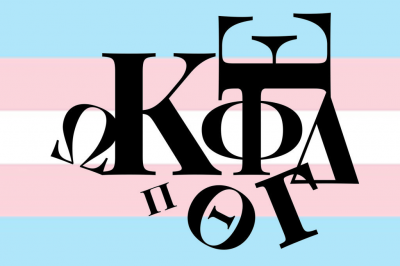
Boston University sororities and fraternities are working to promote inclusivity of transgender and nonbinary students, despite Greek Life’s foundation as a binary social system.
BU has 10 Panhellenic sororities and nine recognized fraternities in the North American Interfraternity Conference for social Greek life.
Delta Delta Delta, one of BU’s sorority chapters, has made efforts to increase gender inclusivity through fundraising events and philanthropy projects.
Penelope Fiaschetti, a junior in the College of Arts and Sciences and a trans woman, is a current member of Tri Delta at BU, following her acceptance during Spring rush.
Fiaschetti said she considers herself part of the “sisterhood,” and feels welcomed by it.
“[There is] a sense of community between us as women,” Fiaschetti said. “We’re a family. We all feel comfortable around each other.”
But CAS junior Preethi, a trans woman who requested to omit her last name, said she is not a part of BU’s Greek Life because of a transphobic experience at a fraternity party last October.
At the Halloween party, Preethi said, she dressed up as a female character and was not out as trans at the time.
“Halfway through, someone started saying, ‘Is that a guy?’” Preethi said. “Then everyone started looking at me.”
A member of the fraternity then asked Preethi to leave the party, she said, and she hasn’t been to another frat party since.
Preethi said she thinks transphobia is an issue ingrained in Greek life, but that it is also present in the attitudes of individual members.
“I think it’s more systematic,” Preethi said. “I don’t know many people in sororities, but from my experiences with people in frats, it feels like the frat brothers have individual biases as well.”
Wyatt Greiner, a junior in the Questrom School of Business, is the vice president of Sigma Chi Upsilon, a BU fraternity currently seeking approval for a charter from its national fraternity after it was revoked in 2014. The charter would enable BU’s Sigma Chi to become a full chapter again.
Greiner said the culture of fraternities can often be “masculine” and “overwhelming.” He added the brothers must demonstrate an ability to uphold the Jordan Standard, which values good morals and good character, among other traits.
“We cannot teach you those values that you have to have,” Greiner said. “It’s making sure that these are going to be outstanding men in their community.”
Greiner said BU Sigma Chi is “very open” to any person who identifies as a man, including those in the LGBTQ community.
“We need to expand our members,” Greiner said. “We’re just looking for people who have those seven [Jordan] values to really become leaders on campus.”
Greiner said the Sigma Chi bylaws, however, dictate a member must be a “bonafide male.” Greiner said the language is “extremely outdated” and the group is looking to change the bylaws to be more inclusive, but at this point, the frat will accept members who fall outside this technical requirement.
“If the situation presented itself,” Greiner said, “we’re not going to use that as a way to discriminate.”
Alpha Delta Phi sister Autumn Moon, a sophomore in the College of Communication, said her sorority is taking steps to be more inclusive through philanthropic causes and weekly cultural competency meetings.
“ADPi works so, so hard to make sure that it is an inclusive space for everyone,” Moon said. “Our philanthropy is all about trying to make it a more inclusive space, and the girls are really supportive of one another.”
Moon said she acknowledges that Greek life has not historically been considered inclusive, especially for marginalized genders.
“Greek organizations have been around for a very long time and the culture and the foundation that they’re built on is not, I think, the most inclusive,” Moon said, “because the whole premise of a Greek organization is to be an exclusive organization.”
Moon said while the majority of students involved in Greek life are straight, some ADPi members are in the LGBTQ community. She said Greek life is not about “being one kind of person.”
“It’s not being straight,” Moon said. “It’s not being white. It’s not being cis. It’s just about cultivating a community where people can have friendships and home and work on philanthropy and have a social life together.”




